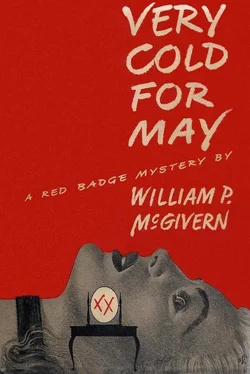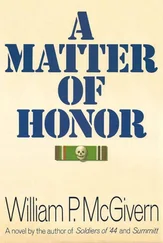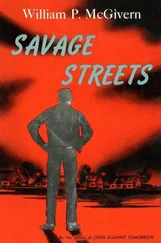“Oh, relax a minute,” Jake said. “You’re annoyed because you’ve been held up as a symbol of fascistic bureaucracy. Well, that’s a bit thick, of course. But even if I weren’t paid to think so at the moment, I’d have a low opinion of your committee and particularly its eminent chairman, Senator Hampstead. He’s always struck me as a tyrannical, prudish old bastard. But the important thing right now is that Riordan has not been charged with any crimes, and until he is, and until that charge is proved by due process of law, then it’s my job and my duty to defend him from the mudslinging innuendoes, and damnation-by-association tactics of you Washington ferrets.”
“Do you actually believe that?” Prior asked.
Jake let out his breath slowly. For a second he wished he could feel convinced he was doing a job because it was the right thing to do; he wished he was standing on the side of the angels. But of course he wasn’t.
“No, I don’t believe that,” he said shortly. “I’m a press agent. And public relations is a process which takes money from a client, and puts it in the pocket of a press agent. But as long as you have no case against Riordan, then my position is proportionately stronger. Until you get some evidence, I’ll just knock you silly in the papers every day.”
“Okay, then, listen to this,” Prior said, putting out his cigarette with a curiously deliberate gesture. “I came to Chicago as Senator Hampstead’s representative, to investigate a contract Riordan made with the Army to produce one-hundred-and-fifty-five-millimeter gun barrels. Do you know how we got on his trail? No, you probably don’t know, or care. We received reports from theater commanders in the ETO, reports which had come to them through company, regiment, and division commanders, about barrels which cracked and split during combat firing. It took time to coordinate these reports, to determine what firm had supplied most of the defective barrels, and to get ordnance reports on the quality of the metal recovered from those burst guns. That was a long painstaking job and when it was completed we saw that Dan Riordan’s company had made most of those barrels.
“Now we’re moving in on him. Already our first check into his books tells us that he arbitrarily ignored his contracts with the army. He used a cheaper grade of steel, a steel that cracked under the heat and pressure of firing.”
Jake fingered his letter opener and shrugged slightly. “You probably have more information than I do, Prior. But Riordan told me that much himself. He said it was a question of using cheaper steel or of making no barrels at all. He preferred using the cheaper steel.”
“Sure, he would,” Prior said, harshly. “Because he charged the government for the price of the high-quality steel. Riordan owns, among other things, a casting company and a steel mill. He bought cheap steel from his mill, the Sterling Steel Corporation, and made a profit on the sale, and then he put that cheap steel into the barrels made by the Riordan Casting Company. When he sold those barrels — supposedly made of high-grade steel — he collected a double profit, the first on the sale from his mill to his steel company, and secondly by unloading that inferior material at a price paid for the very best steel.”
“You’ve worked pretty fast,” Jake said, pointlessly; he didn’t know what else to say.
“We’re still working, too,” Prior said, grimly. “We also know that Riordan bribed a government plant inspector, a man named Nickerson, to okay the faulty barrels. When we catch up with Nickerson we’ll have a case that Riordan will never wriggle out of. Possibly you can understand my irritation now. Maybe I sounded like a stuffed shirt coming in here to complain about your doing your job, but we know what kind of a client you’ve got — and it hurts to be made a fool of when you’re in the right.”
“Of course,” Jake said, absently. He was thinking that the agency would have to change its pitch on Riordan now. Jake hadn’t thought much about Riordan’s guilt or innocence, but he had felt that if Riordan were guilty he would have covered things so he wouldn’t be caught. Obviously, he was not only a crook, but a stupid one.
“Why don’t you simply lock him up, if you’ve got him cold?” Jake asked.
“First of all, that’s not our job. My report goes to the Senator who, in spite of your feeling, is an able and conscientious man, and he decides whether or not his committee will investigate the matter thoroughly. When that investigation is over, the Attorney General will move in to prosecute. And our case right now is not fully completed. We won’t get through his books for several more weeks.”
Prior stood up abruptly and smiled at Jake, “You probably think I’m a very naive person to come here like this and raise hell with you for making me look like a fool in the papers. Perhaps I did sound off to the reporters without thinking. Maybe we can have lunch some day, if you’re not tied up, and stop fighting each other.”
“Of course,” Jake said. He found himself rather admiring Prior’s frankness, although he was normally dismayed by honest people, because they were an erratic element in the well-ordered and hypocritical world of business.
They walked down the corridor to the reception room together, and Jake found his thoughts turning to May again, as they seemed to inexorably now. He said, “Here’s something I’d like to talk to you about. May Laval was a friend of mine, and I talked with her the night before she was killed. I knew about the diary she’d kept and what she intended doing with it, of course, and I asked her to lay off Riordan. She said she was going ahead with the book, not to spite Riordan, particularly, but because it was a thing she had to do. Now, what changed her mind? She called you later that night, didn’t she?”
“Well, she called my assistant, Coombs. About one in the morning, I think. She said she had some information that we might find useful. Coombs told me and I called her and made a date for the following morning. The next morning we learned she’d been killed. I understand from the papers that now a man named Avery Meed has been killed, and that he had the diary.”
“That’s right,” Jake said. “But the diary is still missing.”
“Well, perhaps it will turn up. I’d like to see it, you know. You say you knew this May Laval. What sort of a person was she?”
Jake shrugged. “That’s a difficult question,” he said.
They entered the reception room and Prior stopped with his hand on the doorknob. “Judging from the papers she was simply a rather glorified prostitute.”
“That’s not quite accurate,” Jake said.
“Well, I didn’t mean to sound stuffy,” Prior said hastily. “But the picture one gets second hand is hardly that of a convent-bred little miss. The papers are playing that up pretty strong, of course.” He smiled at Jake as he said this, but his eyes were cool. “The papers have a habit of distorting things, I know,” he said.
“Let’s not start that again,” Jake said. “Getting back to May: She was a generous friend, and could be loyal, warm-hearted and amusing. Her vice was that she needed attention, and worked a bit too hard getting it.”
“Yes, I saw her home, you know,” Prior said. “She apparently used everything from her red pajamas to her furniture with the thought of hitting you squarely in the eye. Her book would undoubtedly have been wonderful reading. But tell me this; the papers said Meed took the diary from her home. Does that mean he killed her?”
“It’s a thought,” Jake said. “It’s undoubtedly occurred to the police.”
“Yes, it’s an obvious idea,” Prior said.
They were both silent a moment, and then Prior smiled at Jake, and said, “We’re in the Postal Building if you should want me...”
Читать дальше












